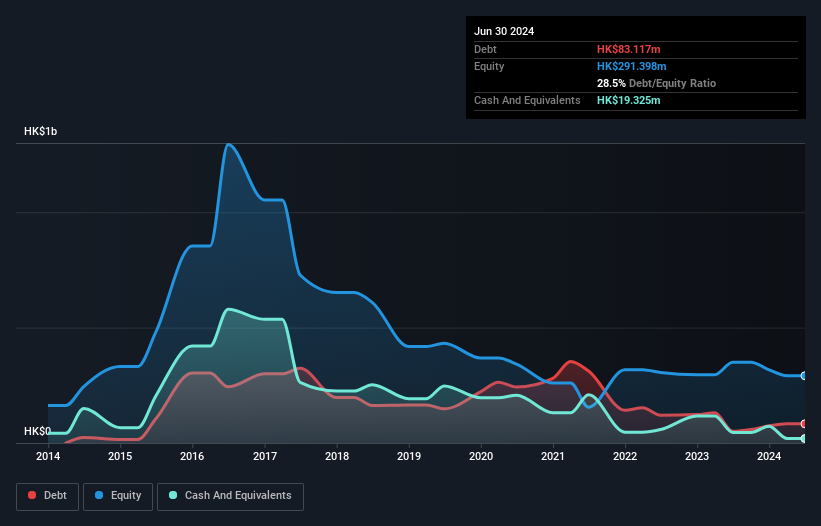Here's Why Hang Tai Yue Group Holdings (HKG:8081) Can Afford Some Debt
David Iben put it well when he said, 'Volatility is not a risk we care about. What we care about is avoiding the permanent loss of capital.' So it seems the smart money knows that debt - which is usually involved in bankruptcies - is a very important factor, when you assess how risky a company is. As with many other companies Hang Tai Yue Group Holdings Limited (HKG:8081) makes use of debt. But the more important question is: how much risk is that debt creating?
Why Does Debt Bring Risk?
Debt and other liabilities become risky for a business when it cannot easily fulfill those obligations, either with free cash flow or by raising capital at an attractive price. If things get really bad, the lenders can take control of the business. While that is not too common, we often do see indebted companies permanently diluting shareholders because lenders force them to raise capital at a distressed price. Of course, debt can be an important tool in businesses, particularly capital heavy businesses. The first step when considering a company's debt levels is to consider its cash and debt together.
Check out our latest analysis for Hang Tai Yue Group Holdings
What Is Hang Tai Yue Group Holdings's Net Debt?
As you can see below, at the end of June 2024, Hang Tai Yue Group Holdings had HK$83.1m of debt, up from HK$51.1m a year ago. Click the image for more detail. However, it also had HK$19.3m in cash, and so its net debt is HK$63.8m.

How Strong Is Hang Tai Yue Group Holdings' Balance Sheet?
According to the last reported balance sheet, Hang Tai Yue Group Holdings had liabilities of HK$86.7m due within 12 months, and liabilities of HK$50.0m due beyond 12 months. Offsetting these obligations, it had cash of HK$19.3m as well as receivables valued at HK$59.4m due within 12 months. So its liabilities total HK$58.0m more than the combination of its cash and short-term receivables.
This deficit isn't so bad because Hang Tai Yue Group Holdings is worth HK$211.4m, and thus could probably raise enough capital to shore up its balance sheet, if the need arose. However, it is still worthwhile taking a close look at its ability to pay off debt. When analysing debt levels, the balance sheet is the obvious place to start. But you can't view debt in total isolation; since Hang Tai Yue Group Holdings will need earnings to service that debt. So when considering debt, it's definitely worth looking at the earnings trend. Click here for an interactive snapshot.
In the last year Hang Tai Yue Group Holdings's revenue was pretty flat, and it made a negative EBIT. While that hardly impresses, its not too bad either.
Caveat Emptor
Over the last twelve months Hang Tai Yue Group Holdings produced an earnings before interest and tax (EBIT) loss. Its EBIT loss was a whopping HK$23m. Considering that alongside the liabilities mentioned above does not give us much confidence that company should be using so much debt. Quite frankly we think the balance sheet is far from match-fit, although it could be improved with time. For example, we would not want to see a repeat of last year's loss of HK$58m. In the meantime, we consider the stock very risky. There's no doubt that we learn most about debt from the balance sheet. However, not all investment risk resides within the balance sheet - far from it. Case in point: We've spotted 2 warning signs for Hang Tai Yue Group Holdings you should be aware of, and 1 of them doesn't sit too well with us.
At the end of the day, it's often better to focus on companies that are free from net debt. You can access our special list of such companies (all with a track record of profit growth). It's free.
Valuation is complex, but we're here to simplify it.
Discover if Hang Tai Yue Group Holdings might be undervalued or overvalued with our detailed analysis, featuring fair value estimates, potential risks, dividends, insider trades, and its financial condition.
Access Free AnalysisHave feedback on this article? Concerned about the content? Get in touch with us directly. Alternatively, email editorial-team (at) simplywallst.com.
This article by Simply Wall St is general in nature. We provide commentary based on historical data and analyst forecasts only using an unbiased methodology and our articles are not intended to be financial advice. It does not constitute a recommendation to buy or sell any stock, and does not take account of your objectives, or your financial situation. We aim to bring you long-term focused analysis driven by fundamental data. Note that our analysis may not factor in the latest price-sensitive company announcements or qualitative material. Simply Wall St has no position in any stocks mentioned.
About SEHK:8081
Hang Tai Yue Group Holdings
An investment holding company, engages in the hospitality and related services, money lending, and assets investments businesses in Hong Kong and Australia.
Excellent balance sheet with low risk.
Market Insights
Community Narratives



